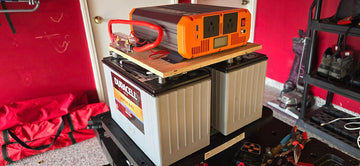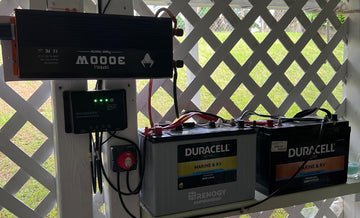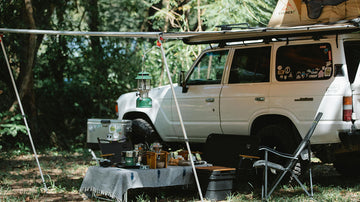Two main types of deep-cycle batteries are on the market today: lead-acid and lithium-ion. Lead-acid batteries dominated many applications until the concept of lithium-ion batteries was introduced in the 1970s. By the 1990s, lithium-ion batteries were rapidly gaining popularity. You may ask yourself: which battery is better for my solar system?
This article will answer the question of how to choose the type of battery for a DIY solar system installation, whether installing an off-grid solar system or adding storage to a grid-tied solar system.
How do lithium-ion and lead-acid batteries work?
Lithium-ion (Li-ion) batteries rely on lithium ions to facilitate the movement of charge between the cathode and anode. They typically consist of a graphite anode, a lithium metal oxide cathode (e.g. LiCoO2, LiFePO4), and an electrolyte consisting of lithium salts dissolved in a solvent (usually a mixture of organic carbonates).

Lead-acid batteries work with lead dioxide and lead plates immersed in a sulphuric acid electrolyte; the positive electrode is usually lead peroxide (PbO2) and the negative electrode is pure lead (Pb). During charging, a DC power supply applies a voltage to cause a current to flow through the battery. The lead peroxide on the positive electrode is reduced to lead, while the lead on the negative electrode is oxidized to lead sulfate. During discharge, the lead sulfate on both electrodes is converted back to lead dioxide and lead, releasing electrical energy.

Lithium vs. lead-acid batteries: in the solar system
Lithium Battery
Considered the best battery type for use in solar power systems, LiFePO4 (Lithium Iron Phosphate) batteries are a type of lithium battery that uses LiFePO4 as the cathode material. Compared to other types of lithium batteries, LiFePO4 batteries have a lower risk of thermal runaway, are safer, and have a lower self-discharge rate.
Lead-Acid Battery
FLA batteries have plates that are completely submerged in water. If the water level falls below the lowest mark, the battery performance may deteriorate. They must therefore be checked regularly and topped up with water to ensure proper operation.
Sealed Lead-Acid Battery
The AGM (Absorbent Glass Mat) batteries are valved and sealed with fiberglass mat separators. The fiberglass mat absorbs and immobilizes the electrolyte in place, thus preventing leakage even if the battery is tilted or placed in various orientations. They require little maintenance.
Main difference between lithium and lead-acid batteries
There are several key factors to consider when comparing lead-acid and lithium-ion batteries. Lead-acid batteries are a proven, lower-cost technology. They have been used in a wide range of applications, including automobiles and uninterruptible power supplies. Lithium-ion batteries, on the other hand, are a premium battery technology with longer life and higher efficiency, but you'll have to pay more for the performance boost.
While lead-acid batteries are cost-effective and suitable for some applications, lithium-ion batteries offer superior performance and efficiency, making them the preferred choice for many modern appliances and electric vehicles. The choice between lead-acid and lithium-ion batteries depends on specific requirements, cost considerations, and the intended use of the battery capacity and technology.
Energy density and weight
Lithium-ion batteries can store more energy in a smaller, lighter package than lead-acid batteries. They are suitable for applications that require high energy density, such as mobile devices and electric vehicles, where compact size and reduced weight are critical. In contrast, lead-acid batteries, while lacking in energy density, excel at delivering high inrush currents, making them the preferred choice for applications that require sudden bursts of power.
Cycle life
When you discharge a battery and then recharge it using a solar panel, this is called a charge cycle. Our measure of battery life is not the number of years, but how many times a battery can be recharged before it fails.
Lithium-ion batteries typically have a long cycle life of thousands of charge/discharge cycles. Our LiFePO4 lithium batteries are capable of 2,000 to 5,000 cycles (8 to 10 times longer than a typical lead-acid battery). In contrast, lead-acid batteries typically have a shorter cycle life, ranging from a few hundred to about a thousand charge/discharge cycles. They gradually lose their rechargeability over time. Replacement is inevitable every few years, depending on usage patterns.
Efficiency
Charge and discharge efficiency is a key criterion when comparing battery types. Lithium-ion batteries typically have discharge efficiencies between 90 and 95 percent, meaning that most of the energy is efficiently released and used during energy conversion. In contrast, lead-acid batteries typically have a discharge efficiency of between 70 and 85 percent, meaning that some of the energy is lost during energy conversion. For example, if you put 1,000W of solar energy into a lithium-ion battery, you can get more than 950W of power after the charge and discharge process. In the same example, if you use a lead-acid battery, you will only get a maximum of 850W of power.
Higher efficiency means faster battery charging. Depending on your system configuration, it may also mean that you need to buy fewer solar panels, less battery capacity, and a smaller backup generator.
Maintenance requirements
Lithium-ion batteries require less and simpler maintenance than lead-acid batteries. Lead-acid batteries require regular maintenance. This includes close monitoring of electrolyte levels, replenishment of distilled water, and balanced charging to avoid sulphation and delamination.
Environmental impact
In an increasingly sustainable world, environmental impact is a key consideration. The production process of lithium-ion batteries involves the extraction of a finite resource such as lithium, which can cause damage to the local environment. However, it does not contain toxic heavy metals such as lead, making it easy to dispose of and recycle.
Lead batteries contain recyclable lead and have a high recycling rate. However, lead-acid batteries can leak during use, leading to acid contamination of soil and water sources.
Cost Comparison: pricing breakdown
Cost is an ever-present factor in decision-making and plays a key role in the choice between lithium-ion and lead-acid batteries. Lithium-ion batteries are more expensive to manufacture, but costs have fallen over time as technology has advanced and demand has continued to grow. The longer life and higher energy density of lithium-ion batteries help to offset the higher initial cost as a factor in some applications.
Conversely, lead-acid batteries have a lower initial cost, which appeals to budget-conscious consumers. Refined over years of use, lead-acid batteries are manufactured maturely and cost-effectively, making them a viable option. However, the total cost of ownership, including maintenance and replacement, must be weighed against the expected battery life.

Extreme temperature performance
Low-temperature comparison of lithium and lead-acid batteries:
Lithium batteries perform well in cold environments; they can operate normally at temperatures around -4°F (-20°C) and have high discharge capacity. However, the cold can affect the performance of any battery, regardless of type. As a result, you may find that the 'power' is used up more quickly. You may need to recharge more often.
Lead-acid batteries have a much shorter life than lithium batteries, and frequent recharging in winter will result in earlier battery replacement. Lithium batteries are designed for about 2,000 to 5,000 partial cycles, so more cycles in winter won't make much difference. Some lithium batteries have a heating function for when the temperature is too low to charge.
Comparison of Lithium Batteries and Lead Acid Batteries at Low Temperatures
High-temperatures comparison of lithium and lead-acid batteries:
Lead-acid batteries do not perform well at high temperatures. High temperatures accelerate the evaporation of the electrolyte and the chemical reaction inside the battery, resulting in a rapid loss of capacity. At 40°C (104°F) and above, the life of lead-acid batteries is drastically reduced. Lithium-ion batteries contain no acid and operate at temperatures of 104-122°F (40-50°C).TOPBULL's Lithium-ion batteries have a built-in high-temperature cut-off that prevents charging above 122°F (50°C).
Why choose lead-acid batteries over lithium batteries?
Emergency lighting systems: Lead-acid batteries may be a more common choice for emergency lighting systems that require a long-term backup power source because they are relatively inexpensive, stable, and well-adapted to deep cycling.
UPS (uninterruptible power supply) systems: Many UPS systems use lead-acid batteries as a backup power source because they provide reliable electrical support, are moderately expensive, and are easier to maintain.
Solar street lights: For devices such as solar street lights that need to provide illumination at night, lead-acid batteries can be a good choice because they can be recharged quickly and are relatively inexpensive.
Agricultural use: For certain agricultural applications, such as automated irrigation systems or electrical support for farm equipment, lead-acid batteries may be more suitable because they are relatively durable, affordable, and easy to maintain.
Battery backup systems: Let's say you're building a system with battery backup for emergency power outages. Ideally, you will only use these batteries once a year (or just a few times if you live in an area with an unreliable power grid).
Why choose lithium batteries over lead-acid batteries?
There are many reasons to choose lithium batteries, such as off-grid systems for houses, which rely on lithium batteries for deep cycling, or portable systems for outdoor camping, caravanning trips, etc.

















